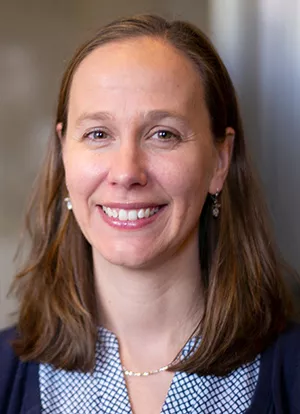Statistician Lynne Steuerle Schofield '99 Fosters Interdisciplinary Approach to Community Engagement

Lynne Steuerle Schofield ’99
The Chronicle of Higher Education: How a Math Class Sparked Students’ Engagement in Their Community
What comes to mind when you hear the phrase “community-engaged scholarship”? Chances are it doesn’t involve logistic-regression or principal-components analysis. Yet those are skills students use in a statistics course at Swarthmore College to help local nonprofits figure out what their data are telling them about their work. It’s just one example of how professors are trying to design coursework for undergraduates that connects the classroom with the outside world.
Lynne Steuerle Schofield '99, associate provost of faculty diversity and development and associate professor of statistics, came up with the idea for taking a community-based learning approach after she decided she was spending way too much time finding interesting problems and usable data sets for students in her 200-level applied-statistics course. Plus, she says, students weren’t learning a valuable lesson about the practical application of statistics: Life is messy, and so is data.
What if she sent her students out to work with the information they’d found, rather than what she had presented to them in tidy data sets? The challenge, of course, was to give the students academically meaningful work that could also benefit organizations in need of such help. And she had to find nonprofits and agencies with enough resources to collect data on their work, but not enough that they could do their own analyses.
Schofield began mining her own and her friends’ contacts in the community, and working with the campus’s Lang Center for Civic and Social Responsibility. They looked for partners in nearby Chester, Pa., a lower-income city near Swarthmore, and in Philadelphia, a short train ride away from campus.
...
One group of students helped a local food bank that wanted to know if it was recommending the right blends of foods to families. The students used statistical methods they had learned in class to analyze nutrition information on menus, which grouped foods into certain categories. They found that, collectively, the foods created a diet high in sodium, and recommended the food bank stop handing out salt as a separate item. The students also suggested putting cereal in its own category, separate from grains, because it is vitamin-fortified. That way families could choose both cereal and, say, pasta.
Another group worked with an asthma-management program for children. The organization had received a research grant to see if new, home-based interventions could reduce asthma attacks and, in turn, missed school days and trips to the doctor. The group had enough money to do the interventions, but lacked the ability to analyze the results. Swarthmore students sifted through the data from interventions with 132 children and their families, and found significant improvements followed changes like installing new carpets in their homes or altering the cleaning products they used.
Students reported in their course evaluations that the class felt very useful and gave them skills they could apply elsewhere, Schofield says. She found that some even mentioned it later in job interviews. The course, Schofield says, helped students build empathy for the clients who needed community services. And it got them thinking about ethical and privacy issues around data-driven research.
She’s also thrilled that she could show them that a discipline like statistics can be used for the public good.
“A lot of the really big issues facing us today—poverty, climate change, immigration—if they were easy to solve in one discipline, we would have solved them. It’s the fact that they’re so complicated that they require lots of different ways of thinking,” says Schofield. “The more ways we can think of different ways to solve problems, the farther along we are.”
Learn about Swarthmore’s impact on the local and global community at lifechanging.swarthmore.edu.



